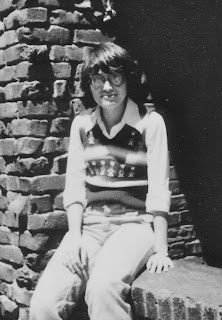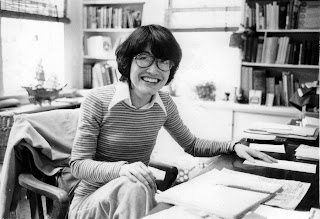Growing up and finding church in the Bay Area
Doreen Der McLeod was born in San Francisco in 1943, the youngest of five children. Her parents had immigrated from Hoiping, China in 1922 and 1938. Her family moved to San Mateo, California when she was six years old to abate her mother’s asthma with a warmer climate. Her family was originally interested in purchasing a home in a new housing development in San Mateo, but because they would not sell property to Chinese, her family ended up in a multicultural neighborhood across the freeway, where they had Japanese, Chinese, Pilipino, Italian, and African American neighbors. Doreen’s dad owned a curios shop on Grant Avenue in Chinatown. Doreen and her siblings commuted to Chung Wah Chinese School in Chinatown and hung out there until 10:00 or 11:00 P.M. when her dad’s store closed for the night.
Doreen attended church from the time she was a young child, but she did not join the church without hesitation. She recalled saying to her Sunday School teacher, “Well, America has a lot of surplus, why can’t we just share it [with impoverished nations]?” When the teacher told her that it would ruin the world economy, she nearly left the church. But in high school, one of Doreen’s Chinese school classmates, Linda Leong (married name: Linda Wang), told her she should come to Donaldina Cameron House. At Cameron House, Doreen found a community where it was okay to have doubts and ask hard questions about faith and justice. There, she was encouraged to live out her faith in everyday actions.
Finishing college while participating in the Free Speech Movement
Doreen entered college at U.C. Berkeley in 1961. At the time, there were only a handful of Asian students at U.C. Berkeley. Every weekend, she commuted back to San Francisco to serve as a Club Leader at Cameron House and attend Sunday worship services at the Presbyterian Church in Chinatown.
 |
| Doreen leading a workshop at Asian Presbyterian Caucus in 1970 |
As the Civil Rights Movement began to gain momentum, word began to spread about Martin Luther King Jr. and the sit-ins at the Woolworth lunch counters in the South. Doreen’s college advisor at Cameron House, Franklin Fung Chow, participated in Martin Luther King’s March on Washington. Rev. Larry Jack Wong, a PCC pastor, participated in the March on Selma. A couple of Cameron House youth, Marion Kwan and Adrienne Fong, traveled to Mississippi to register African Americans to vote through a church program called Delta Ministry. They returned to the Bay Area with moving stories of meeting African American families in the South who were not allowed to vote.
The Civil Rights Movement hit closer to home for Doreen in 1964 when the U.C. Berkeley administration banned the Student Non-Violent Coordinating Committee (SNCC) and the Congress of Racial Equality (CORE), both key Civil Rights groups, from recruiting in Sproul Plaza where student groups typically recruited. This ignited the Free Speech Movement at U.C. Berkeley.
The infamous image of the Free Speech Movement depicts activist Mario Savio standing on top of a police car shouting through a speakerphone, surrounded by hundreds of rallying students. But Doreen said that the newspaper reports about what was happening at U.C. Berkeley were not consistent with her experience of what was happening. During our interview, Doreen recalled,
The campus was in turmoil. Students really were struggling… The conversations were different depending on where people were at. Most seniors said, ‘This is my last year, I’ve gotta attend classes and graduate.’ And we argued with each other about the right thing to do. There were students that descended on Sproul Plaza and sat in and were arrested. And then, there was just this buzz going through the campus. There was also this silence, this eerie silence that was part of the campus as either classes were shut down or different things happened. And then there were tons of police on campus, which was not a usual experience for us. Occasionally, you saw police, but to have helmet policemen with batons and full riot gear was very intimidating.
At the time, Doreen was a senior, one year from graduation, and her father was working hard at his shop on Grant Avenue to put her, her brother, and her sister through college. Their generation was the first of her family’s four generations in the United States to go to college. Doreen’s parents had told her to go to college, earn a degree, do well in school, and do well in life. She wanted to respect the sacrifices her parents were making for her to be able to go to college, but finally decided, “This is something I have to make a decision about. What does my faith call me to do? What are my values?” That CORE and SNCC could not recruit students for Civil Rights activities just didn’t seem right to her, so Doreen made sure she had enough money to bail herself out of jail if she got arrested and joined the Free Speech protests.
Students boycotted classes for two weeks to protest the arrest of those who had sat in at Sproul Plaza. Five hundred students were arrested and sent to Santa Rita Jail. But students weren’t the only ones involved in the Free Speech Movement. A number of professors canceled their classes. And when the students were arrested, a group of professors organized, drove up to Santa Rita, and bailed students out of jail.
 |
| Doreen as a Girls’ Worker at Cameron House in 1967. |
Advocating for women, parks, and immigrants in Chinatown
After graduating from college, Doreen spent a year in Appalachia as a Vista volunteer. Upon returning to the Bay Area, she intended to put her biological science degree to use in a lab job, but Cameron House Director Dick Wichman offered her the job of Girls’ Worker. As the only female in the Youth Department, Doreen coordinated an intramural girls’ basketball league and provided a woman’s perspective on youth programming at Cameron House. While working at Cameron House, she learned about social work from Mae Wong and Lorna Logan who were working in Cameron House’s Christian Social Services Department at the time. They inspired her to pursue a Master’s degree in Social Work.
 |
| Doreen on the steps of Cameron House in 1972. |
The Immigration and Nationality Act of 1965 increased the annual immigration quota from 105 Chinese to 20,000 Chinese. This resulted in a new wave of Chinese immigrants in Chinatown who needed language and immigration assistance, childcare, and services for the elderly. In the early 1970s, Lucinda Lee, a Cameron House alumna, founded the first bilingual pre-school program at the Chinatown YWCA and recruited Doreen and Jeanne Choy Tate to be on staff.
In 1969, those developing the Mandarin Towers planned to raze Chinese Playground to build a parking garage. Rev. Harry Chuck quickly collected hundreds of signatures to protest the demolition. A small group decided to form the Committee for Better Parks and Recreation advocate for the improvement of the existing open space and recreational facilities in Chinatown. Doreen actively participated on this committee with Sister Beverly. In 1972, Alan Jacobs of the City Planning Department put together the 701 Study. The goal of the study was to survey the recreational and housing needs of Chinatown. It documented that Chinatown was one of the densest neighborhoods in the United States, second only to Manhattan, and had very little open space.
One of the first projects that the Committee for Better Parks and Recreation in Chinatown successfully completed was the renovation of Chinese Playground. This was done in collaboration with park users such as students from Commodore Stockton Elementary School and St. Mary’s School. The innovative woodpiles and polyhedron structure became a model replicated by a number of parks throughout the city and won an architectural award. The Committee went on to secure city funds and volunteers to renovate all three parks in Chinatown and put in a new play structure at Washington Square Park.
 |
| Doreen as interim director of Social Services in her office at Cameron House in 1979. |
In 1979, Doreen got married and had two children. She continued to advocate for the needs of diverse Asian American communities, working with seniors at On Lok and the Chinatown Neighborhood Improvement Resource Center (now Chinatown Community Development Corporation).
In 2001, she became the Executive Director of Donaldina Cameron House. Though she retired in 2009, she continues to be active in the community and has gone to New Orleans a number of times to help with the post-Katrina rebuilding efforts.